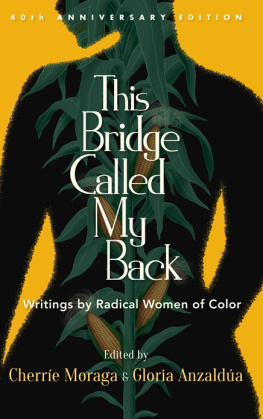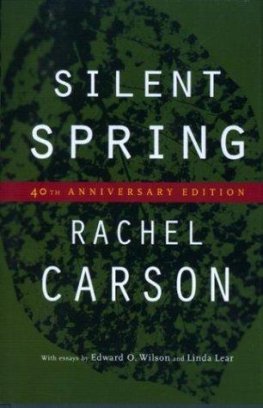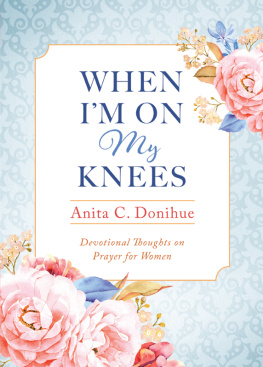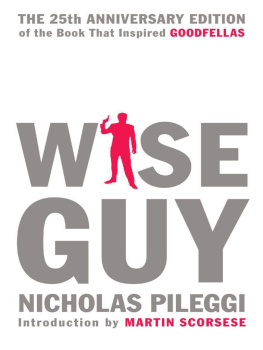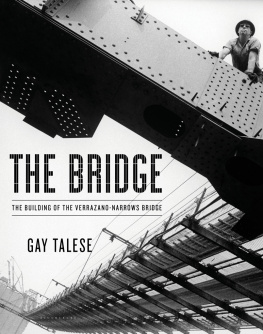Praise for This Bridge Called My Back
This Bridge Called My Back dispels all doubt about the power of a single text to radically transform the terrain of our theory and practice. Twenty years after its publication, we can now see how it helped to untether the production of knowledge from its disciplinary anchorsand not only in the field of womens studies. This Bridge has allowed us to define the promise of research on race, gender, class and sexuality as profoundly linked to collaboration and coalition-building. And perhaps most important, it has offered us strategies for transformative political practice that are as valid today as they were two decades ago.
Angela Davis,
University of California, Santa Cruz
This Bridge Called My Back has served as a significant rallying call for women of color for a generation, and this new edition keeps that call alive at a time when divisions prove ever more stubborn and dangerous. A much-cited text, its influence has been visible and broad both in academia and among activists. We owe much of the sound of our present voices to the brave scholars and feminists whose ideas and ideals crowd its pages.
Shirley Geok-lin Lim,
University of California, Santa Barbara
This book is a manifestothe 1981 declaration of a new politics US Third World Feminism. No great de-colonial writer, from Fanon, Shaarawi, Blackhawk, or Sartre, to Mountain Wolf Woman, de Beauvoir, Saussure, or Newton could have alone proclaimed this politic born of necessity. This politic denies no truths: its luminosities drive into and through our bodies. Writers and readers alike become shape-shifters, are invited to enter the shaman/witness state, to invoke power differently. US Third World Feminism requires a re-peopling: the creation of planetary citizen-warriors. This book is a guide that directs citizenry shadowed in hate, terror, suffering, disconnection, and pain toward the light of social justice, gender and erotic liberation, peace, and revolutionary love. This Bridge transits our dreams, and brings them to the real.
Chela Sandoval,
University of California, Santa Barbara
This Bridge
Called My Back
Fortieth Anniversary Edition

Celia Herrera Rodrguez, Omecihuatl, 1979
Watercolor on fiberglass paper, 22 30
Destroyed in fire in 1982
This Bridge
Called My Back
writings by
radical women of color
Fortieth Anniversary Edition
Edited by
Cherre Moraga
and
Gloria Anzalda

Cover art designed by Amane Kaneko
Published by State University of New York Press, Albany
2021 Cherre Moraga and The Gloria E. Anzalda Literary Trust
All rights reserved
Printed in the United States of America
No part of this book may be used or reproduced in any manner whatsoever without written permission of the publisher. No part of this book may be stored in a retrieval system or transmitted in any form or by any means including electronic, electrostatic, magnetic tape, mechanical, photocopying, recording, or otherwise without the prior permission in writing of the publisher.
For information, contact State University of New York Press, Albany, NY
www.sunypress.edu
Library of Congress Cataloging-in-Publication Data
This bridge called my back : writings by radical women of color / edited by Cherre L. Moraga and Gloria E. Anzalda. Fortieth anniversary edition.
pages cm
Includes bibliographical references and index.
ISBN 978-1-4384-8827-1 (hardcover : alk. paper)
ISBN 978-1-4384-8828-8 (pbk. : alk. paper)
1. FeminismLiterary collections. 2. WomenUnited StatesLiterary collections. 3. American literatureMinority authors. 4. Minority womenLiterary collections. 5. American literatureWomen authors. 6. RadicalismLiterary collections. I. Moraga, Cherre, editor. II. Anzalda, Gloria, editor.
| PS509.F44T5 2015 |
| 810.809287dc23 | 2014039109 |
10 9 8 7 6 5 4 3 2 1
para
Elvira Moraga Lawrence y
Amalia Garca Anzalda
y para todas nuestras madres
por la obediencia y
la insurreccin
que ellas nos ensearon.
for
Elvira Moraga Lawrence and
Amalia Garca Anzalda
and for all our mothers
for the obedience and rebellion
they taught us.
Contents
Cherre Moraga
Gloria Anzalda and The Gloria E. Anzalda Literary Trust
Cherre Moraga
Toni Cade Bambara
Kate Rushin
Cherre Moraga
Cherre Moraga and Gloria Anzalda
Nellie Wong
mary hope whitehead lee
Cherre Moraga
Rosario Morales
Naomi Littlebear Morena
Chrystos
Genny Lim
Cherre Moraga
Mitsuye Yamada
Anita Valerio
Barbara Cameron
Aurora Levins Morales
Chrystos
Jo Carillo
Jo Carillo
Chrystos
Mitsuye Yamada
Judit Moschkovich
Kate Rushin
doris davenport
Rosario Morales
Audre Lorde
Audre Lorde
Rosario Morales
Kate Rushin
Kate Rushin
Barbara Smith and Beverly Smith
Cheryl Clarke
Barbara Noda
Merle Woo
Mirtha N. Quintanales
Mirtha N. Quintanales
Naomi Littlebear Morena
Gloria Anzalda
Gabrielle Daniels
Nellie Wong
Norma Alarcn
Chrystos
Chrystos
Gloria Anzalda
Combahee River Collective
Cherre Moraga
Gloria Anzalda
Andrea Canaan
Pat Parker
Chrystos
Cherre Moraga
Gloria Anzalda
Cherre Moraga
Gloria Anzalda
Artwork
Celia Herrera Rodrguez
Hulleah Tsinhnahjinnie
Yolanda M. Lpez
Betye Saar
Happy/L.A. Hyder
Theresa Hak Kyung Cha
Liliana Wilson
Ana Mendieta
Enough Is Enough
Preface to the Fortieth Anniversary Edition
Cherre Moraga
The phenomenon of a forty-year-old This Bridge Called My Back may be best understood as a document of the living legacy of forebearers bound not by blood, but by the bridge of intracultural women of color consciousnessthe living breadth of which far exceeds the pages and geographies of this book. A certain collective ancestral spirit has sustained this collection through its many pauses in production, including the untimely death of coeditor Gloria Anzalda in 2004. Along with her, we remember each of the contributors who have joined Gloria as ancestor: Audre Lorde, Toni Cade Bambara, (la Boricua) Rosario Morales, Barbara Cameron (Lakota), and the power that is Pat Parker.
A few days before this writing, Hawaiian sovereignty activist and writer-warrior Haunani-Kay Trask joined this pantheon of sisters. One week earlier, a Chicana foremother of Bridge, Betita Martnez, also passed at the age of ninety-six. With the proximity of their departures, the word sisterhood resonates more deeply in me than it has in a long time. As foremothers, they become our accessible relations. I turn to them in this writing.

